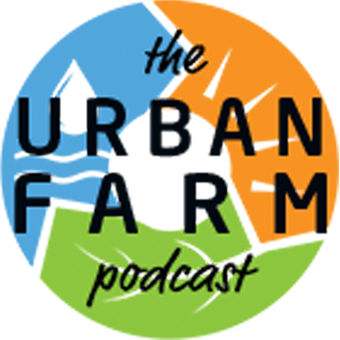
The Urban Farm Podcast with Greg Peterson
Featuring special guests such as Jason Mraz, Kari Spencer, Lisa Steele, and many more!
Welcome to The Urban Farm Podcast, your partner in the Grow Your Own Food revolution! This 3-day per week audio only podcast features special guests like Jason Mraz, Lisa Steele, and Kari Spencer as we discuss the art and value of growing food in urban areas. We'll explore topics such as urban beekeeping and chicken farming, permaculture, successful composting, monetizing your farm, and much more! Each episode will bring you tips and tricks on how to overcome common challenges, opportunities to learn from the experience of people just like you, and plenty of resources to ensure you're informed, equipped, and empowered to participate more mindfully in your local food system... and to have a great time doing it!
- 37 minutes 39 seconds859: Holistic Gardening Insights with Janis Norton - A Rosie Replay
Learning Holistic Gardening through Permaculture Principle
In This Podcast: of Rosie on the House, Janis Norton the manager of all things Urban Farm, Romey Romero and Farmer Greg discuss holistic gardening and permaculture. They define holistic gardening as considering the entire ecosystem, including your yard and neighborhood. The conversation covers permaculture ethics—care for the earth, care for people, and care for the future—and practical tips like zoning and regenerative systems. They also introduce the Permaculture Design Course, emphasizing it as a deep dive into sustainable and interconnected gardening practices.
Visit www.UrbanFarm.org/859-Rosie for the show notes and links on this episode!
Need a little bit of advice or just a feedback on your design for your yard or garden?The Urban Farm Team is offering consults over the phone or zoom. Get the benefits of a personalized garden and yard space analysis without the cost of trip charges. You can chat with Greg, Janis or Ray to get permaculture based feedback.Click HERE to learn more!Become an Urban Farm Patron and listen to more than 850 episodes of the Urban Farm Podcast without ads. Click HERE to learn more.
*Disclosure: Some of the links in our podcast show notes and blog posts are affiliate links and if you go through them to make a purchase, we will earn a nominal commission at no cost to you. We offer links to items recommended by our podcast guests and guest writers as a service to our audience and these items are not selected because of the commission we receive from your purchases. We know the decision is yours, and whether you decide to buy something is completely up to you.
21 January 2025, 7:00 am - 40 minutes 4 seconds858: Seeds of Innovation and Natural Harmony
A Seed Chat with Bill McDorman
In this episode, Greg Peterson from Urban Farm U and Bill McDorman discuss seed-saving and the importance of embracing creativity and chaos in gardening, particularly during winter. They delve into personal anecdotes about sustainable practices and running businesses, highlighting the intersections of fear, excitement, and change in various aspects of life. Additionally, they touch on the evolving practices in permaculture and grain cultivation, particularly Kernza, and its potential for sustainable agriculture.
Visit www.urbanfarm.org/858-seed for the show notes on this episode, and access to our full podcast library!
What is the Seed Chat?
At least ten times a year we have a live Seed Saving Class with Bill McDorman, the former Executive Director of Rocky Mountain Seed Alliance, Ketchum, Idaho. He got his start in the bio-regional seed movement while in college in 1979 when he helped start Garden City Seeds. In 1984, Bill started Seeds Trust/High Altitude Gardens, a mail order seed company he ran successfully until it sold in 2013.
Come join us for the next live class, or catch up on our previous classes through our podcast episodes. Either way you will expand your seed knowledge and gain new perspectives on your food system.
Register anytime for the next event.
Register Here for the Monthly Seed Saving Class with Live Q&A
Become an Urban Farm Patron and listen to more than 850 episodes of the Urban Farm Podcast without ads. Click HERE to learn more.
*Disclosure: Some of the links in our podcast show notes and blog posts are affiliate links and if you go through them to make a purchase, we will earn a nominal commission at no cost to you. We offer links to items recommended by our podcast guests and guest writers as a service to our audience and these items are not selected because of the commission we receive from your purchases. We know the decision is yours, and whether you decide to buy something is completely up to you.
17 January 2025, 7:00 am - 22 minutes 10 seconds857: Rebecca Newburn on Building Seed Swap Resources
Seed exchange resources, tips and tools.
In This Podcast: Rebecca Newburn, discusses the importance and logistics of organizing seed swaps. She explains the benefits of seed swaps, including local adaptation of seeds and community connections. Then highlights various resources she's created, such as organizing guides, seed swap participants guides, and seed labeling templates to improve the experience for both donors and borrowers. Rebecca also emphasizes the importance of proper labeling and education on seed diversity and viability. Additionally, she introduces innovative tools and resources available on SeedLibraryNetwork.org to aid seed swap organizers and participants.
Our Guest: Rebecca is the co founder of Richmond Grows Seed Lending Library, a free seed exchange located in the Richmond public library in Richmond, California, where she lives to create a library template.
She designed has helped thousands of seed libraries launch around the world. She is the founder of seed library network dot org and created. The Cool Beans Seed Libraries Newsletter, an international publication supporting local seed projects. Rebecca appeared on our podcast in episode 700 in October of 2022. So for an in depth look at what seed libraries can do for you, you can listen there.
Visit UrbanFarm.org/SeedSwap for the show notes and links on this episode!
Need a little bit of advice or just a feedback on your design for your yard or garden?The Urban Farm Team is offering consults over the phone or zoom. Get the benefits of a personalized garden and yard space analysis without the cost of trip charges. You can chat with Greg, Janis or Ray to get permaculture based feedback.Click HERE to learn more!Become an Urban Farm Patron and listen to more than 850 episodes of the Urban Farm Podcast without ads. Click HERE to learn more.
*Disclosure: Some of the links in our podcast show notes and blog posts are affiliate links and if you go through them to make a purchase, we will earn a nominal commission at no cost to you. We offer links to items recommended by our podcast guests and guest writers as a service to our audience and these items are not selected because of the commission we receive from your purchases. We know the decision is yours, and whether you decide to buy something is completely up to you.
https://www.urbanfarm.org/2025/
14 January 2025, 7:00 am - 48 minutes 2 seconds856: Mike Clow on Technology on the Homestead
Balancing Technology and Nature in Homesteading
In This Podcast: Mike Clow, a homesteader, engineer, and co-founder of Desert Life Ranch, discusses his journey from suburban life to sustainable living in the Arizona desert. He emphasizes the importance of integrating technology like solar power and aquaponics to enhance self-reliance and sustainability. Mike introduces his innovative project 'Homestead Electronics,' which uses affordable, custom-built sensors to monitor various homestead parameters, aiming to simplify and improve homestead management. Mike also touches on the challenges and continuous learning involved in homesteading and the importance of perseverance. He offers practical advice for those interested in merging technology with homesteading for more efficient and resilient living.
Our Guest: Mike Clow is a homesteader, engineer and entrepreneur. He and his wife Peggy Sue are founders of the Desert Life Ranch, which they are developing into a center for sustainable and self reliant living in central Arizona. Mike enjoys homesteading, foraging, living in nature, and working with various forms of technology including solar power and aquaponics while spreading the word about sustainable living.
Mike's Recommended Book - Folks, This Ain't Normal by Joel Salatin
Visit UrbanFarm.org/HomesteadElectronics for the show notes and links on this episode!
Need a little bit of advice or just a feedback on your design for your yard or garden?The Urban Farm Team is offering consults over the phone or zoom. Get the benefits of a personalized garden and yard space analysis without the cost of trip charges. You can chat with Greg, Janis or Ray to get permaculture based feedback.Click HERE to learn more!Become an Urban Farm Patron and listen to more than 850 episodes of the Urban Farm Podcast without ads. Click HERE to learn more.
*Disclosure: Some of the links in our podcast show notes and blog posts are affiliate links and if you go through them to make a purchase, we will earn a nominal commission at no cost to you. We offer links to items recommended by our podcast guests and guest writers as a service to our audience and these items are not selected because of the commission we receive from your purchases. We know the decision is yours, and whether you decide to buy something is completely up to you.
10 January 2025, 7:00 am - 1 hour 4 minutes855: David Stelzer on revolutionizing organic food distribution.
Changing the way we stock our pantries.
In This Podcast: David Stelzer, founder and CEO of Azure Standard, discusses the evolution of his company from selling organic grain out of his pickup truck to building a nationwide organic food distribution network.
David shares his personal journey into organic farming, inspired by his parents' commitment to a healthy diet after his own health issues as a child. He describes the creation of Community Drops, a unique delivery system that spans 50 states, enabling Azure Standard to serve over 3 million families. David also talks about the importance of healthy diets, sustainable farming practices, and Azure Standard's mission to provide high-quality, affordable organic food. The podcast delves into the company's development, the challenges faced, and the impact on local food systems.
Our Guest: David Stelzer is a pioneer in organic food and healthy soil practices. He is the founder and CEO of Azure Farm and Azure Standard, a leading producer and distributor of natural, organic, and non-GMO foods across the nation.
David began his journey into organic farming as a teenager in the 1970s, driven by a passion for providing nourishing, healthful foods cultivated in chemical-free, healthy soil. At just 21, he started selling grain from the family farm out of his pickup truck, which laid the foundation for Azure Standard in 1987.
Under his leadership, Azure Standard developed a unique delivery system known as Community Drops, creating a robust organic food distribution network that spans 50 states, including Hawaii and Alaska, with over 4,000 local drop points. To date, Azure has delivered organic produce and foods to more than 3 million families across the U.S.
His vision is to meet the world’s growing demand for truly healthful food, all while staying at the forefront of agricultural innovation.
David's Book Recommendation - Science in Agriculture: Advanced Methods for Sustainable Farming by Arden Anderson
Visit UrbanFarm.org/AZURE for the show notes and links on this episode!
Need a little bit of advice or just a feedback on your design for your yard or garden?The Urban Farm Team is offering consults over the phone or zoom. Get the benefits of a personalized garden and yard space analysis without the cost of trip charges. You can chat with Greg, Janis or Ray to get permaculture based feedback.Click HERE to learn more!Become an Urban Farm Patron and listen to more than 850 episodes of the Urban Farm Podcast without ads. Click HERE to learn more.
*Disclosure: Some of the links in our podcast show notes and blog posts are affiliate links and if you go through them to make a purchase, we will earn a nominal commission at no cost to you. We offer links to items recommended by our podcast guests and guest writers as a service to our audience and these items are not selected because of the commission we receive from your purchases. We know the decision is yours, and whether you decide to buy something is completely up to you.
7 January 2025, 7:00 am - 47 minutes 9 seconds854: Debbie Piesen on Building Home Scale DC Grids.
Living Energy Farm's Renewable Journey Explained.
In This Podcast: Debbie Piesen from Living Energy Farm discusses sustainable energy systems and microgrids. Debbie explains her journey and the challenges of living off-grid without fossil fuels. She shares the benefits and challenges of DC microgrids over AC systems and the importance of good design and decentralized energy production. Additionally, Debbie highlights various sustainable practices and projects, including solar ovens and battery storage, that are being implemented at Living Energy Farm and in the Caribbean. The discussion emphasizes the necessity of communal effort and education in transitioning to renewable energy sources.
Our Guest: Debbie is one of the founders of Living Energy Farm (LEF), an organic farm and intentional community in Louisa, Virginia that is off-the-grid and uses no fossil fuels. When she is not working on the farm, Debbie teaches others about sustainable energy systems and installs DC Microgrids, an innovative solar energy system design developed at the farm. She has two children who are both named after persimmon varieties..
Visit UrbanFarm.org/LivingEnergyFarm for the show notes and links on this episode!
Debbie's Recommended Book - Green Illusions by Ozzie Zehner
Debbie's website - Living Energy Farm - LivingEnergyFarm.org
Need a little bit of advice or just a feedback on your design for your yard or garden?The Urban Farm Team is offering consults over the phone or zoom. Get the benefits of a personalized garden and yard space analysis without the cost of trip charges. You can chat with Greg, Janis or Ray to get permaculture based feedback.Click HERE to learn more!Become an Urban Farm Patron and listen to more than 850 episodes of the Urban Farm Podcast without ads. Click HERE to learn more.
*Disclosure: Some of the links in our podcast show notes and blog posts are affiliate links and if you go through them to make a purchase, we will earn a nominal commission at no cost to you. We offer links to items recommended by our podcast guests and guest writers as a service to our audience and these items are not selected because of the commission we receive from your purchases. We know the decision is yours, and whether you decide to buy something is completely up to you.
3 January 2025, 7:00 am - 29 minutes 30 seconds853: Dianne Blazek on Insights on Plant Breeding.
Understanding how plants get from seed to our gardens.
In This Podcast: We interview Diane Blazek, the executive director of All America Selections and National Garden Bureau, about the process of plant innovation and how new plant varieties make their way into gardens. Diane explains the various stages a plant goes through—from breeding to distribution—highlighting the roles of breeders, brokers, and growers. They discuss different propagation methods, including seeds and vegetative cuttings, and the intricacies involved in each step. Diane also touches on the importance of flowering plants for pollination, how to stay informed about new varieties through the National Garden Bureau, and shares a bit of horticultural history connected to Victory Gardens. Lastly, Diane offers advice for gardeners to try new plants and visit local public gardens..
Our Guest: Diane Blazek is the executive director of All America Selections and National Garden Bureau. She has been deeply and happily immersed in gardening from a very early age, from growing up on a small family farm in Missouri to her suburban lot in the Chicagoland area. She is passionate about everything green.
Visit UrbanFarm.org/NGB for the show notes and links on this episode!
Dianne's Website https://ngb.org
Need a little bit of advice or just a feedback on your design for your yard or garden?The Urban Farm Team is offering consults over the phone or zoom. Get the benefits of a personalized garden and yard space analysis without the cost of trip charges. You can chat with Greg, Janis or Ray to get permaculture based feedback.Click HERE to learn more!Become an Urban Farm Patron and listen to more than 850 episodes of the Urban Farm Podcast without ads. Click HERE to learn more.
*Disclosure: Some of the links in our podcast show notes and blog posts are affiliate links and if you go through them to make a purchase, we will earn a nominal commission at no cost to you. We offer links to items recommended by our podcast guests and guest writers as a service to our audience and these items are not selected because of the commission we receive from your purchases. We know the decision is yours, and whether you decide to buy something is completely up to you.
27 December 2024, 7:00 am - 52 minutes 10 seconds852: Post Hurricane Helene Ag Help - A Garden Chat with Alyson Wade
852: Post Hurricane Helene Ag Help
A Garden Chat with Alyson Wade
In This Garden Chat:
In this episode Greg, interviews Alison Wade, founder of Farm Connection. Alison shares her diverse journey from earning three engineering degrees to starting her own nursery in North Carolina. They delve into the impacts of a recent hurricane on local farms and the measures taken to support the community post hurricane Helene, including a successful GoFundMe campaign that raised $230,000 to compensate farmers for lost and donated produce. They discuss future plans to bolster the local food system through potential food hubs and stream bank restoration programs. Both emphasize the importance of local food systems and community resilience in the face of disasters.
Our Guest: Allison is the founder of Farm Connection, an edible medicinal and native plant nursery and garden center near Marshall, North Carolina. She is also the homeschooling mother of four young children and earned not one, not two, but three engineering degrees before starting her own company. She is passionate about supporting homesteaders, local farms and the local food system and can also be found speaking and teaching at local events about lean farming techniques and getting more successful harvests.
Visit www.urbanfarm.org/852-garden for the show notes on this episode, and access to our full podcast library!
Need a little bit of advice or just a feedback on your design for your yard or garden?The Urban Farm Team is offering consults over the phone or zoom. Get the benefits of a personalized garden and yard space analysis without the cost of trip charges. You can chat with Greg or choose one of the senior members of our Urban Farm team to get permaculture based feedback.Click HERE to learn more!Become an Urban Farm Patron and listen to more than 850 episodes of the Urban Farm Podcast without ads. Click HERE to learn more.
*Disclosure: Some of the links in our podcast show notes and blog posts are affiliate links and if you go through them to make a purchase, we will earn a nominal commission at no cost to you. We offer links to items recommended by our podcast guests and guest writers as a service to our audience and these items are not selected because of the commission we receive from your purchases. We know the decision is yours, and whether you decide to buy something is completely up to you.
20 December 2024, 7:00 am - 35 minutes 28 seconds851: Exploring Seed Conferences - A Seed Chat with Julia Dakin
851: Seed Conferences
A Seed Chat with Special Guest Julia Dakin
In this episode, Greg from Urban Farm U hosts a seed chat with Julia Dakin, co-founder of the nonprofit Going to Seed. They discuss Julia's work in promoting seed sovereignty and adapting crops to local conditions. Julia shares her mission of transforming agriculture from an industrialized system to one focused on community and ecological resilience. They delve into the organization's programs, including seed diversity initiatives and supporting farmers in adapting crops to their specific environments. Julia also talks about her participation in the California Organic Seed Summit, addressing issues like land access, seed cooperatives, and engaging younger farmers. The conversation highlights the importance of genetic diversity in seeds for nutrient-dense crops and resilient food systems.
Julia Dakin is the co founder of Going to Seed, an organization dedicated to promoting seed sovereignty and teaching growers how to adapt crops to local conditions and community preferences. For several years she has been working in community driven projects that focus on adapting gardens for for climate and community resilience using ancestral techniques.
Julia leads initiatives that empower local growers to build resilient, locally adapted food systems, enhancing community resilience and food diversity.
Visit www.urbanfarm.org/851-seed for the show notes on this episode, and access to our full podcast library!
What is the Seed Chat?
At least ten times a year we have a live Seed Saving Class with Bill McDorman, the former Executive Director of Rocky Mountain Seed Alliance, Ketchum, Idaho. He got his start in the bio-regional seed movement while in college in 1979 when he helped start Garden City Seeds. In 1984, Bill started Seeds Trust/High Altitude Gardens, a mail order seed company he ran successfully until it sold in 2013.
Come join us for the next live class, or catch up on our previous classes through our podcast episodes. Either way you will expand your seed knowledge and gain new perspectives on your food system.
Register anytime for the next event.
Register Here for the Monthly Seed Saving Class with Live Q&A
Become an Urban Farm Patron and listen to more than 850 episodes of the Urban Farm Podcast without ads. Click HERE to learn more.
*Disclosure: Some of the links in our podcast show notes and blog posts are affiliate links and if you go through them to make a purchase, we will earn a nominal commission at no cost to you. We offer links to items recommended by our podcast guests and guest writers as a service to our audience and these items are not selected because of the commission we receive from your purchases. We know the decision is yours, and whether you decide to buy something is completely up to you.
13 December 2024, 1:00 pm - 37 minutes 1 second850: Winter Growing in the Desert with Jordan Stejskal - A Rosie Replay
850: Winter Growing in the Desert with Jordan Stejskal
A Rosie On The House Radio Show Replay
In This Podcast: This episode of Rosie on the House features Farmer Greg, Romey Romero and guest Jordan Stejskal discussing desert winter gardening. They include the benefits of growing plants from October to May and the variety of plants suitable for this season, such as brassicas, lettuces, and root vegetables and emphasize the importance of soil preparation using compost and fertilizers, and the considerations when sourcing manures.
The team also explores bioregional herbalism, promoting the use of local plants for medicinal and culinary purposes, and the benefits of wild foraging in the desert.
About our guest: Jordan Stejskal is a second generation Phoenix native and a lifelong plant lover. Jordan is a gardener, a home cook, a permaculturist, an educator, and a bioregional herbalist. She has studied plants, people, and their relationships with one another at Phoenix College, the Desert Botanical Gardens, The School of Evolutionary Herbalism, The Urban Farm, and Revis Mountain School of Self Reliance.
She has worked for The Urban Farm for almost four years and helps to run the fruit tree program every winter and the permaculture design course every spring.
Visit www.UrbanFarm.org/850-Rosie for the show notes and links on this episode!
Need a little bit of advice or just a feedback on your design for your yard or garden?The Urban Farm Team is offering consults over the phone or zoom. Get the benefits of a personalized garden and yard space analysis without the cost of trip charges. You can chat with Greg, Janis or Ray to get permaculture based feedback.Click HERE to learn more!Become an Urban Farm Patron and listen to more than 850 episodes of the Urban Farm Podcast without ads. Click HERE to learn more.
*Disclosure: Some of the links in our podcast show notes and blog posts are affiliate links and if you go through them to make a purchase, we will earn a nominal commission at no cost to you. We offer links to items recommended by our podcast guests and guest writers as a service to our audience and these items are not selected because of the commission we receive from your purchases. We know the decision is yours, and whether you decide to buy something is completely up to you.
10 December 2024, 7:00 am - 38 minutes 53 seconds849: Meghan Baker on Navigating Cooperative Extension Programs.
849: Meghan Baker on Navigating Cooperative Extension Programs.
Helping farmers find success.
In This Podcast horticultural professional Meghan Baker discusses the intricacies of small farm management and the vital role of Cooperative Extension agents. Meghan shares her journey from a childhood fascination with nature to her current role as a small farms extension agent. She describes the key duties of a Cooperative Extension agent, including bringing university research to the local farming community, providing technical assistance, and supporting sustainable and regenerative farming practices.
Meghan highlights the role of community partners such as the Appalachian Sustainable Agriculture Project in transforming the agricultural landscape from tobacco to diversified farming. The episode also covers the importance of soil testing, disease and pest identification resources, and the benefits of forest farming. Meghan emphasizes her passion for continuous learning and the significance of slow, attentive observation in agriculture. She concludes by encouraging farmers to utilize the resources and expertise provided by Cooperative Extension services.
Our Guest: Meghan Baker is a horticultural professional based in Asheville and currently serves as the Small Farms Extension Agent in Buncombe County for the NC Cooperative Extension Service. Meghan holds a MS degree in Plant & Environmental Studies from Clemson University.
As an outreach educator and technical consultant, she helps farmers navigate production and business challenges with crops ranging from vegetables to herbs to forest products.
An avid naturalist and outdoor enthusiast, Meghan also holds certifications as a North Carolina Environmental Educator, a Southern Appalachian Naturalist and an Interpretive Guide. A native of Western North Carolina, Meghan is deeply committed to sustaining the agricultural heritage and productive lands in the region.
Meghan's recommended Book - Wildflowers and Plant Communities of the Southern Appalachian Mountains by Timothy Spira.
Visit UrbanFarm.org/CoopAgent for the show notes and links on this episode!
Need a little bit of advice or just a feedback on your design for your yard or garden?The Urban Farm Team is offering consults over the phone or zoom. Get the benefits of a personalized garden and yard space analysis without the cost of trip charges. You can chat with Greg, Janis or Ray to get permaculture based feedback.Click HERE to learn more!Become an Urban Farm Patron and listen to more than 850 episodes of the Urban Farm Podcast without ads. Click HERE to learn more.
*Disclosure: Some of the links in our podcast show notes and blog posts are affiliate links and if you go through them to make a purchase, we will earn a nominal commission at no cost to you. We offer links to items recommended by our podcast guests and guest writers as a service to our audience and these items are not selected because of the commission we receive from your purchases. We know the decision is yours, and whether you decide to buy something is completely up to you.
6 December 2024, 7:00 am - More Episodes? Get the App
Your feedback is valuable to us. Should you encounter any bugs, glitches, lack of functionality or other problems, please email us on [email protected] or join Moon.FM Telegram Group where you can talk directly to the dev team who are happy to answer any queries.
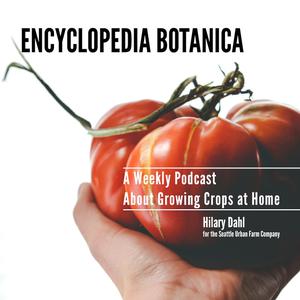 Encyclopedia Botanica
Encyclopedia Botanica
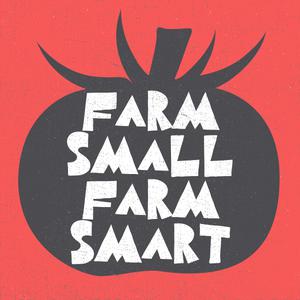 Farm Small Farm Smart
Farm Small Farm Smart
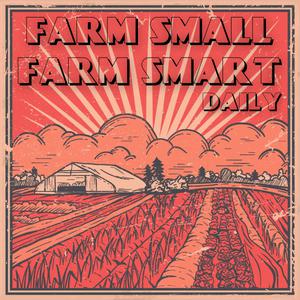 Farm Small Farm Smart Daily
Farm Small Farm Smart Daily
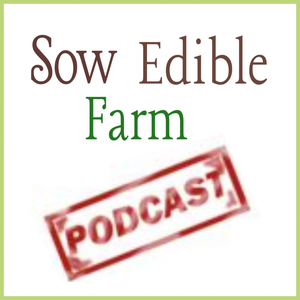 Sow Edible Podcast
Sow Edible Podcast
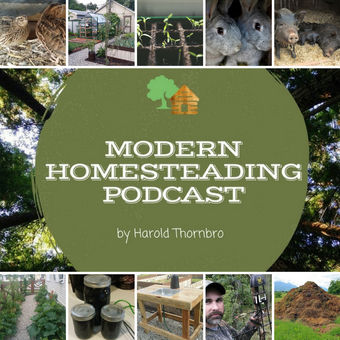 The Modern Homesteading Podcast
The Modern Homesteading Podcast